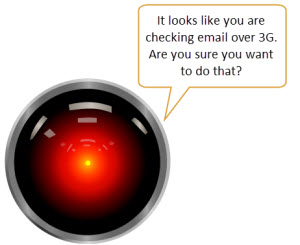Smartphones aren't hungry for data: We are

A complaint I hear regularly leveled against modern smartphones and tablets is that they are incredibly data-hungry and can burn through a costly data allowance in days.
Sorry, but I've got news for you. It's not these devices that are the data-hungry monsters: it's us.
While on trips to the U.S. and Europe, ZDNet's Zack Whittaker recently suffered a shock when he discovered how much data his iPhone was consuming by merely doing trivial things like checking email and using Twitter and Facebook. The data bill gave him such a shock, that he went back to using his native BlackBerry.

The problem isn't the iPhone -- or whichever device you're using -- the problem is us. It's a combination of our expectation for instant access to information wherever we are, and our naivety over how much data we're actually using.
We're taking the way we work at a desktop that's connected to a fat pipe to the Internet, or a notebook connected to a Wi-Fi router, and expecting to be able to do the same things when we're on the move, and for a similar cost. I've seen people tether a notebook to a smartphone, spend a few hours' blissfully and enthusiastically browsing sites like YouTube, and later wonder where their data allowance for that month went.
Another problem is speed. While more speed is usually a good thing, it can work against you when you're on a limited data allowance. I remember the first time that my Internet connection was fast enough to watch a video real-time without needing to buffer. I thought that was cool and couldn't see a downside, but there is one.
Here's an example of how this can work against you. You're out and about with your shiny new iPad 3 when a friend sends you a link to a funny video on YouTube. Since you've got a data plan, you decide to take a look, but after thirty seconds into what is a five-minute video you decide your friend's idea of funny isn't in step with yours and you stop watching. Chances are that while you only watched thirty seconds or so of the video, your iPad, especially if it happens to be on an LTE network, will have downloaded the whole video in that time. Your friend has just aided and abetted in you burning through anything between 30--200 megabytes of your data allowance, depending on the quality of the video.
Video is your data allowance's arch nemesis. Did you know that watching an hour of TV on your iPad can consume a gigabyte of your precious data plan? Neither did The Houston Chronicle's Dwight Silverman, and he's a smart man. Cheap, high-speed Internet has conditioned us to click "Play" with no thought given to how many bytes we're shifting back and forth.
ZDNet's James Kendrick suggests using Wi-Fi as much as possible when out and about. He also suggests an experiment where you measure how much data your smartphone is using by disabling Wi-Fi for a period and only using the cellular data connection, while keeping a close eye on the data consumption metrics while you do this.
You'll be amazed how even little things like checking Twitter and Facebook eat up data. Throw photos usage into the mix, by using a service such as Flickr, and you're ramping consumption up by an order of magnitude. Standard definition video kicks consumption up another order of magnitude, and pushes most peoples' data allowances in the danger zone. High-definition video sends consumption through the stratosphere.
I remember the time when smartphones didn't do that much, yet it was a time when we could get out hands on unlimited data plans that we really didn't need and couldn't make full use of. Now that we're in a post-PC era and putting increasingly heavier demands on being connected when away from our fat, cheap pipes to the Web, the carriers are limiting us by dishing out data allowances with an eyedropper, yet charging us a king's ransom for the pleasure.
And things show no sign of getting better.
While carriers are improving speed and coverage, there's no indication that data allowances are going to increase any time soon. Unlimited data plans are all but extinct, and there's no sign of them making a comeback in the foreseeable future.
Welcome to the downside of the post-PC world. This world may have given us the ability to check out email, post on Facebook and Twitter, and watch a video of a sneezing baby panda while away from our desk, but do it too much, or in a foreign country, and it will cost you dearly.
Image credit: Wikimedia Commons.
Related: